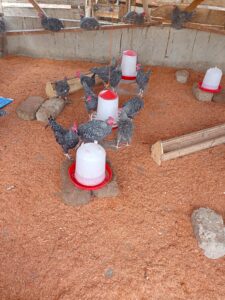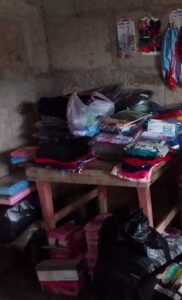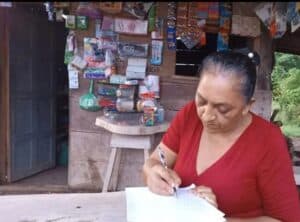
Self-Help Addresses a New Challenge at Schools in the School Feeding Program
By Patience Obour – Promoting Good Nutrition Program Officer
In 2019, Self-Help International provided breakfast for over 800 students from ten schools in rural Ghana through the School Feeding Program, resulting in increased school enrollment and attendance.
As more children go to school, other challenges emerge including: a lack of access to water, latrines, and trash containers. Nkwakrom, one of the rural communities with a Self-Help School Feeding Program, has boreholes (pumps to get water from the ground) supplying safe drinking water; however, the boreholes are located several meters from the primary school.

Mary getting a drink in the middle of the school day.
Young children like Mary (pictured) couldn’t make the trek to fetch water, especially during school hours. Many children, including Mary, stayed dehydrated and had nowhere to wash their hands after visiting the toilet. Diarrhea, cholera and worm infestations are some of the issues that can result from lack of access to clean water.
In response to this challenge, Self-Help Ghana’s nutrition team supplied all ten schools participating in the School Feeding Program with barrels to hold large amounts of clean water and outfitted the barrels with spigots, towels, and soap.
The Self-Help nutrition team realized that the majority of the kids at school (not only those in the School Feeding Program) didn’t know how to properly wash their hands, especially under running water. Self-Help facilitated hand-washing trainings for all of the students at the school to teach them how to effectively wash their hands. This initiative was timely considering that the hand-washing training will not only improve the children’s health at school, it also will go a long way to keep them healthy during the COVID-19 pandemic.
This intervention has brought relief to children like Mary. They now have access to drinking water any time during school hours and don’t have to risk missing classes. They are also able to wash their hands each time they use the bathroom and before and after eating.
Mary wants to become a nurse and take care of the sick in her community, and having access to drinking water and proper sanitation at school is the first step to keeping Mary’s dream alive.

 Previous Post
Previous Post Next Post
Next Post


